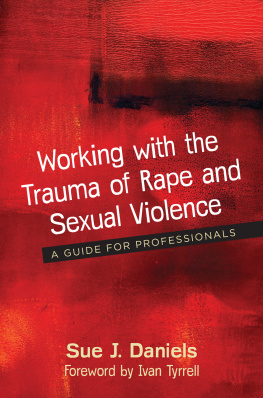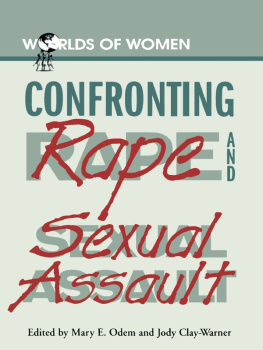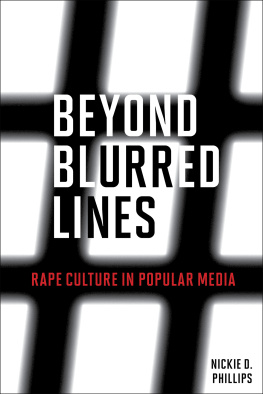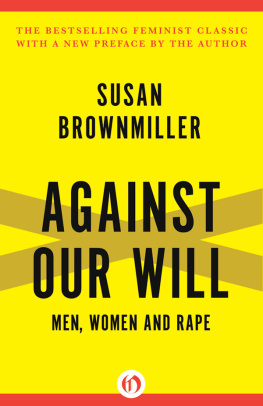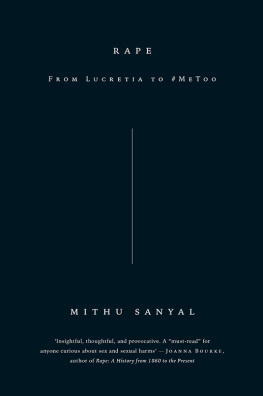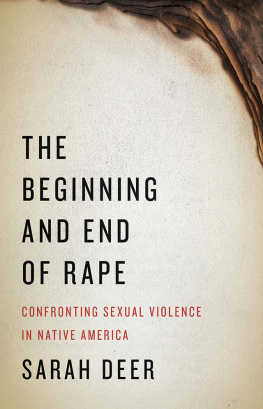Published by State University of New York Press, Albany
2010 State University of New York
All rights reserved
Printed in the United States of America
No part of this book may be used or reproduced in any manner whatsoever without written permission. No part of this book may be stored in a retrieval system or transmitted in any form or by any means including electronic, electrostatic, magnetic tape, mechanical, photocopying, recording, or otherwise without the prior permission in writing of the publisher.
For information, contact State University of New York Press, Albany, NY www.sunypress.edu
Production by Eileen Meehan
Marketing by Michael Campochiaro
Library of Congress Cataloging-in-Publication Data
Weaver, Gina Marie, 1980
Ideologies of forgetting: rape in the Vietnam War/Gina Marie Weaver.
p. cm. (SUNY series in feminist criticism and theory)
Includes bibliographical references and index.
ISBN 978-1-4384-2999-1 (hbk. : alk. paper)
ISBN 978-1-4384-2998-4 (pbk. : alk. paper)
1. Rape as a weapon of warVietnamHistory20th century. 2. Vietnam War, 19611975Atrocities. 3. Rape victimsVietnam. I. Title.
HV6569.V5W43 2010
959.704'38dc22 2009017939
10 9 8 7 6 5 4 3 2 1
Preface
A Postwar Look at Vietnam
Nearly one-third of female veterans who sought V.A. healthcare in 2003 reported experiencing rape or attempted rape in the military.
Corbett, The Women's War
Of the 3,038 investigations of military sexual assault charges completed in 20042005, only 329about one-tenthof them resulted in a court-martial of the perpetrator.
Corbett, The Women's War
While searching for a dissertation topic in 2004 and having recently become fascinated by Vietnam War literature, I taught the Literature and Film of the Vietnam War: Nationalism and Identity at Rice University. The course coincided nicely with the presidential elections, and I planned for our critical focus to be on nationalism and the construction of patriotism and masculinity as we read or viewed the primary texts I had selected. However, as the semester unfolded, an unintended theme in the literature and films I had chosen materialized: neither I nor my students could help but notice the repetitive occurrence of sexual abuse perpetrated by U.S. soldiers against Vietnamese women. I was a bit surprised at this emergent theme, as I had not yet noticed a discussion of sexual violence in the secondary texts through which I was just beginning to sort. After a half-year's worth of research turned up very little in the way of critical discussion of war rape in Vietnam, I began to suspect that I had stumbled into every PhD candidate's dream: a critical blind spot waiting to be investigated.
Though rape by American soldiers has never been a subject that the American publicor academia, as I discoveredwished to acknowledge, the fiction and memoirs that arose out of the Vietnam War repeatedly show it to have been a persistent problem. Larry Heinemann's National Book Awardwinning novel, Paco's Story (1986), presents a prime example of the kinds of perpetration-induced trauma that Vietnam veterans frequently relate in literary and oral accounts of their war experience. In the novel, Vietnam veteran Paco returns to make a life for himself in the United States but remains haunted by memories of the war. The unnamed narratorrevealed later in the novel to be the collective ghost of the company with which Paco served in the war and that was wiped out in a single accident of friendly fire After Gallagher, the soldier instigating the rape, ties up the girl,
There was considerable jostling and arm punching, jawing and grab-ass back and forth, and everyone formed a rough line, so just for that moment Paco got to stand there and take a long look. A peasant girl, not more than fourteen, say, or sixteen And when Gallagher finished, Jonesy fucked her, and when Jonesy was done, half the fucking company was standing in line and commenced to fuck her ragged [A]nd Jesus-fucking-Christ, she had her nostrils flared and teeth clenched and eyes squinted, tearing at the sheer humiliating, grinding pain of it Dudes still ambled over to the doorway to watch, to call out coaching, taking their turns, hanging around the side of the building aftersome getting back in line. (pp. 17981)
The narrator spends a total of eleven pages (a considerable number in a terse novel) narrating Paco's memory of the rape, culminating when the girl is shot execution style, and the soldiers looked at her and at ourselves, drawing breath again and again, and knew that this was a moment of evil, that we would never live the same (p. 184). Thus, the reader becomes aware that Paco's problems result not from garden-variety survivor guilt, but from the terrible guilt of the crime committed by his company in the rape and murder of the Vietnamese woman. With this information, the accident at Fire Base Harriet is reformulated as a moment of justice for the woman, and Paco is unlucky in having escaped it; instead, readers may now see him as condemned to remembrance of a collective crime.
As is generally the case with texts interested in sexual trauma perpetrated by American soldiers in Vietnam, this shockingly brutal scene of gang rape is not widely addressed in works of criticism and reviews despite the fact that the disconcerting heart of the novel turns on the revelation of the rape. Judd's assumption that the gang rape scene is an obligatory part of popular culture's deranged view of the war and is probably just pandering, rather than a depiction of a brutal, widespread activity that was tacitly condoned during the war, demonstrates how little he and reactionary mainstream American culture understand about the war and the desire of the American public to turn away from such nasty actions of fellow Americans. The review also reveals the extent to which popular views of the war have changed since the war years. Perhaps Judd considers the rape a clich because it appears in so much of the best Vietnam War literature.
The fallaciousness of Judd's understanding of war rape as mere clich becomes apparent when one has a fuller knowledge of the cultural artifacts of the war. Volumes of testimony verify that rape was far from a literary device. As early as the International War Crimes Tribunal, a 1967 panel sponsored by Jean Paul Sartre and Bertrand Russell in Stockholm, American, and North Vietnamese soldiers, as well as Vietnamese women political prisoners, reported the sexual abuse of women by Americans and their allies. These participants' reasons for testifying were expressed by Russell's opening words, We are not judges. We are witnesses. Our task is to make mankind bear witness to these terrible crimes and to unite humanity on the side of justice in Vietnam. Many veterans also gave witness to the everyday atrocities committed against women such as routine searches, in which the women would have all their clothes taken off and the men would use their penises to probe them to make sure they didn't have anything hidden anywhere; and this was raping but it was done as searching (p. 13). Such testimony suggests that any understanding of war-related rape by Americans as a mere clich is facile and a dangerous refusal to acknowledge the terrible crimes committed by Americansyet based on primary and secondary texts concerning the war, responses like Judd's seem to be the norm of American belief.


